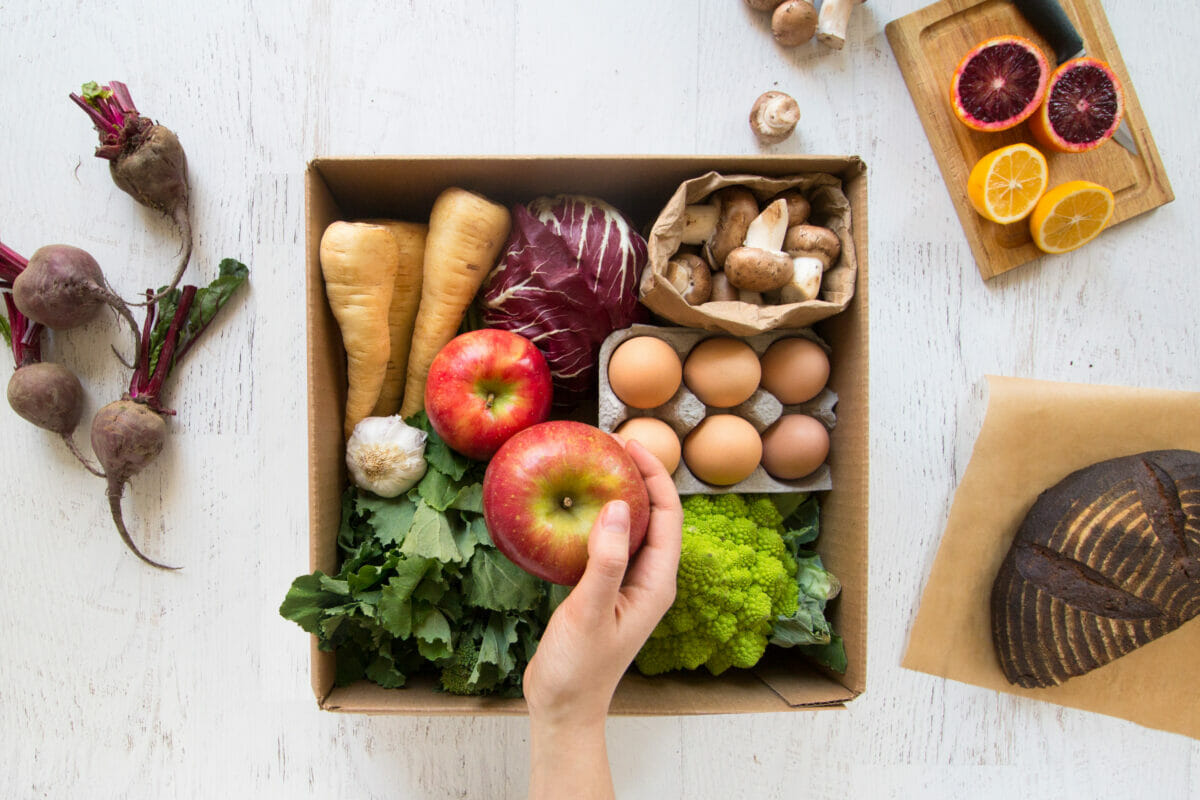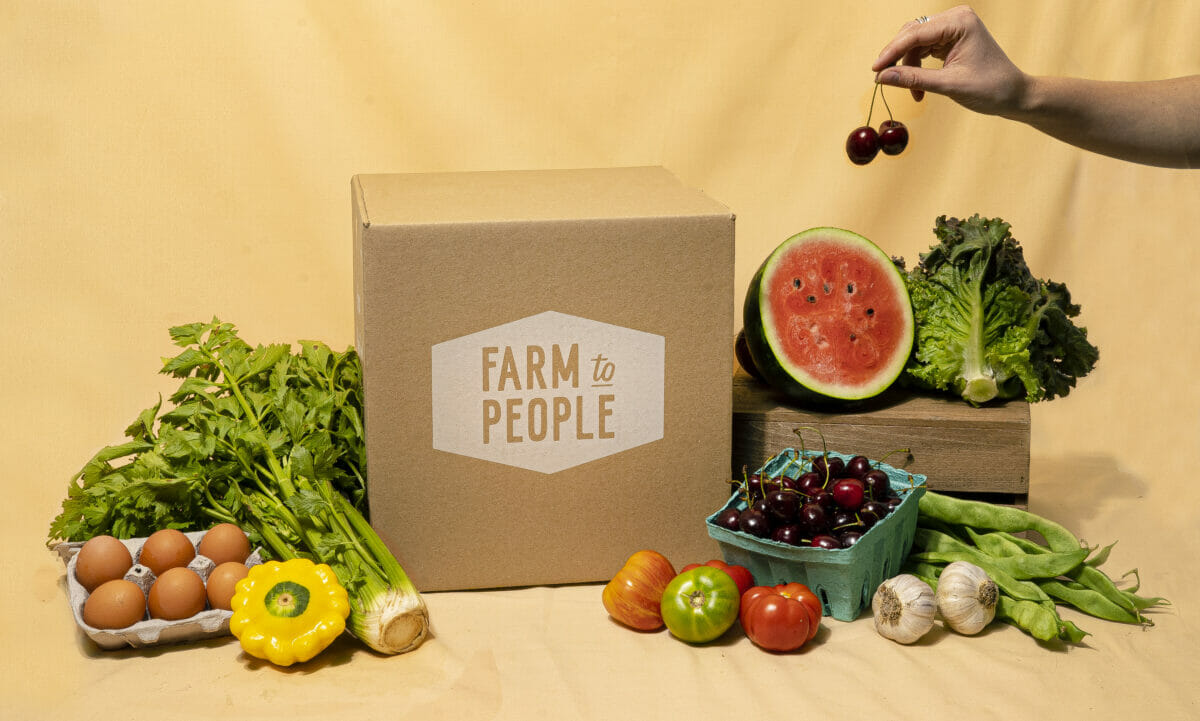A number of online farmers’ market platforms aim to connect farms directly with consumers. But some doubt their effectiveness.

When the pandemic hit in March 2020, temporarily closing farmers’ markets and restaurants, farmer Katie Madden knew she had to quickly shift gears in order to sell what her farm had already grown. So the co-owner of Missoula Grain and Vegetable Co. in southwest Montana signed up for an account on Barn2Door, which allows customers to order products directly from farms for home delivery. “We were able to immediately jump into online sales since we had fresh greens and some winter storage crops, like carrots, ready to sell,” she says.
Madden wasn’t alone in making a pivot. Last year’s COVID-related closures led to a wave of farmers seeking new ways to reach customers quarantining at home. For some entrepreneurial companies, the supply-chain disruption presented an opportunity to develop new web-based marketplaces. Today, there are dozens of programs that help connect farmers directly with convenience-minded consumers, including Barn2Door, Farm to People, Our Harvest and Harvie. Although they all use a tech component to get fresh food into home kitchens, the details and services offered by each differ.
Of all the online market options available, Madden says the farm chose Barn2Door because it offered the closest services to its needs—helping to distribute CSA farm shares and boost crop sales—without breaking the farm’s budget. Founded in 2015, Barn2Door operates nationally, and it provides “the software and the services to help farmers grow and manage their direct sales.” On Barn2Door’s site, users type in their zip code to find participating local farms and their products.
Following a more locally minded approach, the New York City-based Farm to People—a company that turned its focus to being an online farm product-ordering and delivery system in 2019—sources and delivers items from farms in nearby states. Customers in the city, as well as in Newark and Jersey City across the Hudson River, can order curated produce boxes with products from more than 150 farms, most of which are located within a 300-mile radius of the city. They can also add à la carte items ranging from dairy, meat and produce to baked goods and pantry items.
The hyper-local business model means consumers might sometimes get produce that was harvested mere hours before arriving on their doorstep. It’s a sought-after service that’s factored into the company growing 600 percent during the coronavirus pandemic.
But Farm to People is more than just an online platform and delivery service. The goal is to go beyond providing software and web pages to farmers, says CEO Michael Robinov, and to help them do something more with the data gleaned in the process. “At our core, we are really trying to help more farms reach more people,” says Robinov, who describes Farm to People as “a technology and logistics service.”
While Farm to People works with around 150 local farms, it is actively helping 10 of those farms determine what to grow this season, sharing customer preferences from years prior. “We make it so that farmers know exactly what they should be picking and delivering to our warehouse on the timelines that vary from a day before to up to a week before,” says Robinov. “So, we can say ‘Hey, if you grow this this year, there is an appetite for it,’ and it allows farmers to know earlier and plan their crops, creating more predictable income.”
One of those partners is Ironbound Farm in Asbury, New Jersey. Ironbound farm manager Alec Gioseffi says he values the partnership, which started in fall 2019. “Farm to People was involved in our crop planning in the winter time and we grew to their demand. They’ve been a valued partner because they work with us on determining appropriate crops that allow us to provide diversity to their customers and generate a profit for our farm,” he says.

Photo courtesy of Farm to People.
Of course, no digital platform could replicate the interactions farmers have with customers in person. And while online market models might work well on the small, hands-on local level, the large, national nature of some platforms can be riddled with pitfalls.
Missoula Grain and Vegetable Co. has had a mixed experience with Barn2Door. Participating on the platform has helped reduce the farm’s food waste, says Madden. “It helps to sell more crops than we would with market and CSA shares alone. The site also sends pickup reminder emails for CSA members, which helps them remember to pick up,” she says.
Yet the benefits don’t outweigh the drawbacks. “There are frustrating things with [Barn2Door], like glitches, odd details that haven’t been dealt with yet, lack of needed updates,” says Madden, who says the farm is considering switching to another of the many available platforms offering similar services to farmers.
But finding the right one can be tricky, and many have those same technical issues in common. Harvie, another online farmer’s market platform that partners with more than 250 farms across North America, would be Madden’s top choice, but it takes a percentage of sales (a three-percent fee on each credit card transaction, plus $20,000 in fees from its CSA sales) that wouldn’t work for the farm.
At this point, Madden says, “Online platforms generally just don’t meet all the needs farmers have. I’ve even seen some farms using multiple platforms to meet their needs, like a separate platform for CSA sign-up versus à la carte sales.”
When it comes to recommending this model to other farmers, Madden suggests extensively researching the available platforms, collecting information from farms with experience with online sales and analyzing what you need from a platform before making any decisions. “Customizing your own website using a tech-savvy friend or service is probably the only way you’ll get everything you need from a site,” she says.
On the local level, Gioseffi of Ironbound says he would absolutely recommend a partnership with a smaller-scale program such as Farm to People, as long as the farm was set up for the production-to-sale model.
“What’s nice about their model is that we can create weekly amendments to their order to keep up with the demand,” he says, “Because they’re so involved in pre-season planning, we’re growing crops to their specific needs rather than growing produce in the hopes of selling it in the wholesale market.”
A more thorough look at fees would have been helpful because it’s an important consideration for both farms and customers. Referring just to “a three-percent fee on each credit card transaction, plus $20,000 in fees from its CSA sales” is confusing. All credit card processing comes with fees around 3%, and $20k out of what total in sales? These platforms cost money because the people who build and run them deserve to be paid for their work. Farms get a digital retail storefront and shoppers get access to a niche market and the convenience of online shopping and sometimes delivery.… Read more »
“Online Farmers Market” is an oxymoron. Online ordering systems can be a great way to expand farmers’ income streams, but please don’t call them farmers markets. A farmers market lets multiple farmers interact in person with consumers, and keep the retail price of their products. The systems you’re describing are online produce distribution systems.